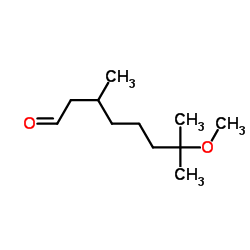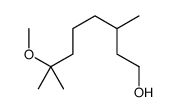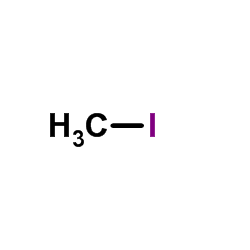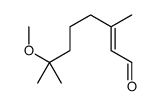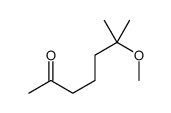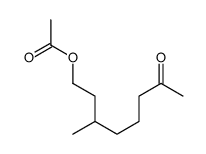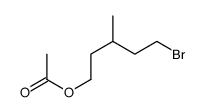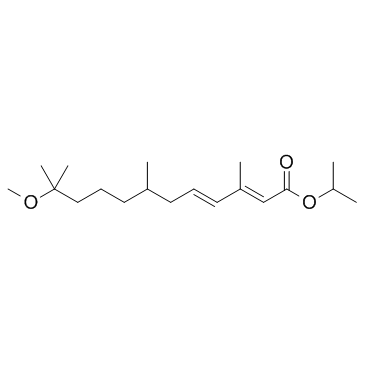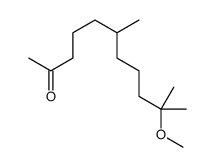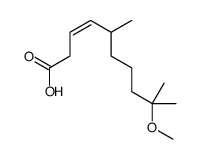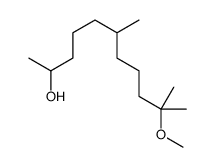3613-30-7
| 中文名 | 7-甲氧基-3,7-二甲基辛醛 |
|---|---|
| 英文名 | 7-methoxy-3,7-dimethyloctanal |
| 中文别名 |
甲氧基香茅醛
7-甲氧基-3,7-二甲基-辛醛 |
| 英文别名 |
UNII:261VCL42SZ
7-methoxy-3,7-dimethyl-octana methoxycitronellal 7-METHOXY-3,7-DIMETH 3,7-dimethyl-7-methoxy-octan-1-al 7-methoxy-3,7-dimethyl-octanal 7-METHOXY CITRONELLAL 3,7-dimethyl-7-methoxyoctanal MFCD00007015 7-Methoxy-3,7-dimethyloctanal 3,7-dimethyl-7-methoxy-1-octana 7-methoxy-3.7-dimethylactanal hydroxycitronellalmethylether Octanal, 7-methoxy-3,7-dimethyl- methoxydihydrocitronellal EINECS 222-784-5 |
| 密度 | 0.9±0.1 g/cm3 |
|---|---|
| 沸点 | 239.4±23.0 °C at 760 mmHg |
| 分子式 | C11H22O2 |
| 分子量 | 186.291 |
| 闪点 | 78.4±16.2 °C |
| 精确质量 | 186.161987 |
| PSA | 26.30000 |
| LogP | 2.18 |
| 蒸汽压 | 0.0±0.5 mmHg at 25°C |
| 折射率 | 1.426 |
| 储存条件 | 密封储存,储存于阴凉、干燥的库房。 |
| 稳定性 | 常温常压下稳定,避免与不相容材料接触。 与强氧化剂,强碱反应。 |
| 计算化学 | 1.疏水参数计算参考值(XlogP):2.2 2.氢键供体数量:0 3.氢键受体数量:2 4.可旋转化学键数量:7 5.互变异构体数量:2 6.拓扑分子极性表面积26.3 7.重原子数量:13 8.表面电荷:0 9.复杂度:141 10.同位素原子数量:0 11.确定原子立构中心数量:0 12.不确定原子立构中心数量:1 13.确定化学键立构中心数量:0 14.不确定化学键立构中心数量:0 15.共价键单元数量:1 |
| 更多 | 1. 性状:无色透明液体 2. 密度(g/mL,25℃):0.87 3. 相对蒸汽密度(g/mL,空气=1):未确定 4. 熔点(ºC):0 5. 沸点(ºC,常压):未确定 6. 沸点(ºC,0.4mmHg):60 7. 折射率(n20/D):1.4364-1.4384 8. 闪点(ºC):98 9. 比旋光度(º):未确定 10. 自燃点或引燃温度(ºC):未确定 11. 蒸气压(mPa,20ºC):未确定 12. 饱和蒸气压(kPa,25ºC):未确定 13. 燃烧热(KJ/mol):未确定 14. 临界温度(ºC):未确定 15. 临界压力(KPa):未确定 16. 油水(辛醇/水)分配系数的对数值:未确定 17. 爆炸上限(%,V/V):未确定 18. 爆炸下限(%,V/V):未确定 19. 溶解性:未确定 |
Synonym:1-Octanal, 3,7-dimethyl-7-methoxy-; 3,7-Dimethyl-7-methoxy-1-octanal; Hydroxycitronellal methyl ether; Methoxycitronellal; Methoxycitronellal methyl ether; Octanal, 7-methoxy-3,7-dimethyl Section 2 - COMPOSITION, INFORMATION ON INGREDIENTS
Risk Phrases: 36/37/38 Section 3 - HAZARDS IDENTIFICATION EMERGENCY OVERVIEW
Irritating to eyes, respiratory system and skin.The toxicological properties of this material have not been fully investigated. Potential Health Effects Eye: Causes eye irritation. May cause chemical conjunctivitis. Skin: Causes moderate skin irritation. Ingestion: May cause gastrointestinal irritation with nausea, vomiting and diarrhea. The toxicological properties of this substance have not been fully investigated. Inhalation: Causes respiratory tract irritation. The toxicological properties of this substance have not been fully investigated. Can produce delayed pulmonary edema. Chronic: Effects may be delayed. Section 4 - FIRST AID MEASURES Eyes: Immediately flush eyes with plenty of water for at least 15 minutes, occasionally lifting the upper and lower eyelids. Get medical aid. Skin: Get medical aid. Flush skin with plenty of water for at least 15 minutes while removing contaminated clothing and shoes. Wash clothing before reuse. Ingestion: Never give anything by mouth to an unconscious person. Get medical aid. Do NOT induce vomiting. If conscious and alert, rinse mouth and drink 2-4 cupfuls of milk or water. Inhalation: Remove from exposure and move to fresh air immediately. If not breathing, give artificial respiration. If breathing is difficult, give oxygen. Get medical aid. Notes to Physician: Treat symptomatically and supportively. Section 5 - FIRE FIGHTING MEASURES General Information: As in any fire, wear a self-contained breathing apparatus in pressure-demand, MSHA/NIOSH (approved or equivalent), and full protective gear. During a fire, irritating and highly toxic gases may be generated by thermal decomposition or combustion. Vapors may be heavier than air. They can spread along the ground and collect in low or confined areas. Extinguishing Media: Water may be ineffective. Use water spray, dry chemical, carbon dioxide, or appropriate foam. Section 6 - ACCIDENTAL RELEASE MEASURES General Information: Use proper personal protective equipment as indicated in Section 8. Spills/Leaks: Clean up spills immediately, observing precautions in the Protective Equipment section. Cover with sand, dry lime or soda ash and place in a closed container for disposal. Provide ventilation. Section 7 - HANDLING and STORAGE Handling: Wash thoroughly after handling. Remove contaminated clothing and wash before reuse. Avoid contact with eyes, skin, and clothing. Keep container tightly closed. Avoid ingestion and inhalation. Use with adequate ventilation. Wash clothing before reuse. Storage: Store in a tightly closed container. Store in a cool, dry, well-ventilated area away from incompatible substances. Section 8 - EXPOSURE CONTROLS, PERSONAL PROTECTION Engineering Controls: Facilities storing or utilizing this material should be equipped with an eyewash facility and a safety shower. Use adequate ventilation to keep airborne concentrations low. Exposure Limits CAS# 3613-30-7: Personal Protective Equipment Eyes: Wear appropriate protective eyeglasses or chemical safety goggles as described by OSHA's eye and face protection regulations in 29 CFR 1910.133 or European Standard EN166. Skin: Wear appropriate protective gloves to prevent skin exposure. Clothing: Wear appropriate protective clothing to prevent skin exposure. Respirators: A respiratory protection program that meets OSHA's 29 CFR 1910.134 and ANSI Z88.2 requirements or European Standard EN 149 must be followed whenever workplace conditions warrant respirator use. Section 9 - PHYSICAL AND CHEMICAL PROPERTIES Physical State: Clear liquid Color: clear, colorless Odor: None reported. pH: Not available. Vapor Pressure: Not available. Viscosity: Not available. Boiling Point: 60 deg C @ .45mmHg Freezing/Melting Point: Not available. Autoignition Temperature: Not applicable. Flash Point: 98 deg C ( 208.40 deg F) Explosion Limits, lower: Not available. Explosion Limits, upper: Not available. Decomposition Temperature: Not available. Solubility in water: Not available. Specific Gravity/Density: .8770g/cm3 Molecular Formula: C11H22O2 Molecular Weight: 186.29 Section 10 - STABILITY AND REACTIVITY Chemical Stability: Stable at room temperature in closed containers under normal storage and handling conditions. Conditions to Avoid: Incompatible materials, excess heat, strong oxidants. Incompatibilities with Other Materials: Strong bases, strong oxidizing agents. Hazardous Decomposition Products: Carbon monoxide, carbon dioxide, acrid smoke and fumes. Hazardous Polymerization: Has not been reported. Section 11 - TOXICOLOGICAL INFORMATION RTECS#: CAS# 3613-30-7: RG7890000 LD50/LC50: CAS# 3613-30-7: Draize test, rabbit, skin: 500 mg/24H Moderate. Carcinogenicity: 7-Methoxy-3,7-dimethyloctanal - Not listed by ACGIH, IARC, or NTP. Other: See actual entry in RTECS for complete information. Section 12 - ECOLOGICAL INFORMATION Section 13 - DISPOSAL CONSIDERATIONS Dispose of in a manner consistent with federal, state, and local regulations. Section 14 - TRANSPORT INFORMATION IATA Not regulated as a hazardous material. IMO Not regulated as a hazardous material. RID/ADR Not regulated as a hazardous material. Section 15 - REGULATORY INFORMATION European/International Regulations European Labeling in Accordance with EC Directives Hazard Symbols: XI Risk Phrases: R 36/37/38 Irritating to eyes, respiratory system and skin. Safety Phrases: S 24/25 Avoid contact with skin and eyes. WGK (Water Danger/Protection) CAS# 3613-30-7: No information available. Canada CAS# 3613-30-7 is listed on Canada's DSL List. CAS# 3613-30-7 is not listed on Canada's Ingredient Disclosure List. US FEDERAL TSCA CAS# 3613-30-7 is listed on the TSCA inventory. SECTION 16 - ADDITIONAL INFORMATION N/A |
|
毒理学数据: 1、皮肤/眼睛刺激性 标准的Draize试验:兔子,皮肤接触:500mg/24H;反应的严重程度:中度。 CHEMICAL IDENTIFICATION
HEALTH HAZARD DATAACUTE TOXICITY DATA
|
| 危害码 (欧洲) | Xi: Irritant; |
|---|---|
| 风险声明 (欧洲) | R36/37/38 |
| 安全声明 (欧洲) | S24/25 |
| 海关编码 | 2912499000 |
| 上游产品 10 | |
|---|---|
| 下游产品 5 | |
| 海关编码 | 2912499000 |
|---|---|
| 中文概述 | 2912499000. 其他醛醚、醛酚及含其他含氧基的醛. 增值税率:17.0%. 退税率:9.0%. 监管条件:无. 最惠国关税:5.5%. 普通关税:30.0% |
| 申报要素 | 品名, 成分含量, 用途, 四聚甲醛报明外观 |
| Summary | 2912499000. other aldehyde-ethers, aldehyde-phenols and aldehydes with other oxygen function. VAT:17.0%. Tax rebate rate:9.0%. . MFN tariff:5.5%. General tariff:30.0% |


